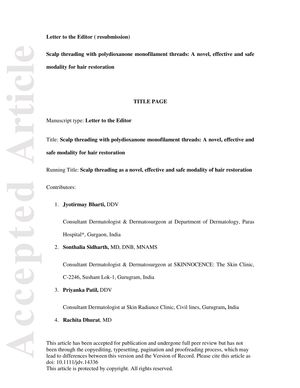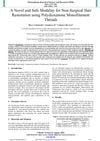Scalp Threading with Polydioxanone Monofilament Threads: A Novel, Effective, and Safe Modality for Hair Restoration
May 2017
in “
Journal of The European Academy of Dermatology and Venereology
”

TLDR Scalp threading with polydioxanone threads is a promising, effective, and safe method for hair regrowth.
Six years ago, a study was conducted to evaluate the efficacy and safety of scalp threading with polydioxanone (PDO) monofilament threads as a novel method for hair restoration. The study involved five male patients suffering from androgenetic alopecia (AGA) who had shown unsatisfactory response to 18 months of treatment with 10% minoxidil and oral finasteride. After a 3-month wash off period from previous therapies, PDO threads were inserted into the patients' scalps. The results, evaluated after 12 weeks, showed an appreciable increase in hair counts in all patients, with an average investigator-evaluated improvement in global photographic improvement (GPI) of 57%, an average trichoscopic hair count increment of 67 HFU/cm², and a mean patient satisfaction score of 6 on a visual analogue scale (VAS) ranging from 1-10. The procedure was well tolerated by all patients, with only mild pain during thread insertion and mild transient swelling reported. The study concluded that scalp threading with PDO threads could be a promising, effective, and safe non-surgical approach to hair regrowth, although further research with larger cohorts was recommended.





